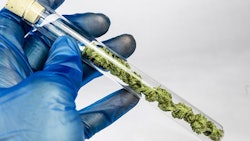
Medical marijuana patients in Georgia can legally possess cannabis oil, but with a law that doesn’t allow cultivation or dispensing, an obvious question persists: How are patients supposed to access their medicine?
According to Georgia’s medical marijuana law, patients who obtain a “Low THC Oil Registry Card” can legally possess up to 20 fluid ounces of “low THC oil,” but it remains unclear how patients can access this oil, as the law does not allow for the cultivation of cannabis or the sale of cannabis oil in the state. Lt. Governor Casey Cagle tasked the newly formed Low THC Medical Oil Access Commission with finding ways to improve access to cannabis oil; the group will hold the first of a series of public meetings later this month. While advocates are encouraged, many obstacles still exist in bringing the oil to qualified patients.
“Georgia’s ‘medical marijuana law’ is not a medical marijuana law,” Tom McCain, executive director for Peachtree NORML, told Cannabis Business Times. “Georgia has a low-THC law in which people who are afflicted by one of 17 conditions can legally possess up to 20 ounces of CBD/low-THC oil, [with the THC content] not to exceed five percent by volume. So, it’s really a cannabidiol law.”
Initially, advocates felt the passage of a medical marijuana law was a breakthrough in the state, according to Chris Lindsey, legislative counsel for the Marijuana Policy Project (MPP). “[State Rep.] Allen Peake had owned medical marijuana in Georgia for a number of years, and he was successful in getting a program through,” Lindsey said. “He was the champion behind the legislation, the sponsor of the first bill. … He was the go-to for all things medical cannabis-related, and what happened was the original bill passed, [and] it was all very exciting. The local advocate community was really excited and felt like they had some momentum.”
Qualifying conditions include end-stage cancer, seizure disorders, Parkinson’s Disease, Autism Spectrum Disorder, intractable pain and post-traumatic stress disorder (PTSD), and only cannabis oil is permitted for treatment—flower and any other cannabis products are prohibited.
To participate in the program, patients with a qualifying condition must first find a doctor who will recommend medical marijuana, which can be challenging, McCain said. “You have to track one of them down, and then you have to make the trip there from wherever you are in Georgia, and then you have to pay them anywhere from $150-300 for a visit so that you can get them to recommend,” he said. “You have to jump through a lot of hoops, and once they recommend, the Department of Public Health has to give you the card, which the cost on that is minimal.” (New cards cost $25 and may be obtained from one of the state’s 20 Public Health Offices.)
Once a patient secures a Low THC Oil Registry Card, they are authorized by state law to possess low THC cannabis oil—but since cannabis cultivation and retail is prohibited in Georgia, there is no way to legally obtain it in the state.
“What [the card] doesn’t do is help answer any questions about what they do when they get that card to actually get access to any compliant products,” Lindsey said. “That’s the big question mark for all those folks.”
“They’ve been kicking around with this for about five years now, and it’s just a big empty box that they keep putting promises into,” McCain added. “It’s really not much of a law—you can’t legally obtain [oil]. In order to get what you are authorized to have by the Georgia Legislature, you have to break federal law by either crossing state borders with it physically or ordering it through the mail. Then there’s that whole problem of, ‘Where do I order from? Where do I know that it comes from that’s lab-tested and safe? How do I find these places in the first place?’ You’ve got these people just jumping through all these hoops down here, and it’s really kind of a sad situation.”
In the last legislative session held earlier this year, lawmakers passed House Bill 65, which created a 10-person study commission—the Low THC Medical Oil Access Commission—to evaluate how to improve access to cannabis oil, including security, manufacturing, product labeling, testing and dispensing. The commission will hold its first meeting Aug. 29 and will hear from patients, parents and organizations. Subsequent meetings will follow and include testimony from law enforcement agencies, doctors and farmers, Politically Georgia reports. A final report with recommendations for legislation will be completed by the end of the year.
“We’ve got a lot of patients who are hopeful that something’s going to come out of this,” McCain said. “It’s been just this long, hard journey for these folks for legislation that is actually meaningless at this time. Once we get in-state cultivation, … then it’s a little different story. But at this point in time, it’s meaningless.”
Also in the last legislative session, intractable pain and PTSD were added to the list of qualifying conditions, but lawmakers remain resistant to embrace broader legalization, McCain said.
“Rep. Peake worked very hard to move the needle closer to where there would be cultivation and processing and sales within the state, and just couldn’t move it,” Lindsey said. “The only thing he was really able to do is add conditions. That was great because we like to see the conditions added, but where people get access and how is not a well-kept secret. They’re fairly loud about the fact that they have to basically break somebody’s laws, and probably Georgia’s along the way, just to get it.”
And Lindsey is skeptical about whether the current legislature will pass a law to expand access to cannabis oil in the state, even if the study commission recommends it. “If they say, ‘Yeah, we absolutely, positively must do this. This is the right thing for every single reason,’ there’s still no reason to think that lawmakers will say, “OK, let’s go do a law,’” he said. “It’s a difficult situation because I think everybody’s expectation was when the law passed, they would go in and figure out how to do a regulatory production sort of approach because it was well-understood even then that, look, you’re telling people that they can have access to this stuff, but you’re not providing them any way to get it, so basically 100 percent of what they have access to is probably breaking somebody’s law. It is a strange situation, and it’s just persisted.”
NORML’s efforts this year, leading up to the next legislative session in January, will be concentrated on decriminalization efforts, McCain said.
“We have five cities and one county that have decriminalized misdemeanor possession—an ounce or less,” McCain said. These include the cities of Atlanta and Savannah, as well as Fulton County (which includes Atlanta).
Two years ago, a decriminalization bill introduced in the State Senate made it through a subcommittee and a committee with bipartisan support, only to stall in the Rules Committee, McCain said.
“This past year, it didn’t even get a hearing, but we’ll submit it again, and we’re working two-year cycles here with our legislature, so we’ll submit it again this year and see where we can get,” he added.
The race for governor this November may also influence cannabis policy reform in the state, he added. Frontrunners are former State House Minority Leader Stacey Abrams (D) and Secretary of State Brian Kemp (R), with the winner replacing term-limited Gov. Nathan Deal (R).
Although both Abrams and Kemp support cannabis expansion, they have different approaches to the issue, according to Politically Georgia. Kemp has said he will take the study commission’s advice, while Abrams has indicated that she will seek to decriminalize some marijuana-related offences and expand in-state cultivation.
“It's been a long, hard fight and it’s going to continue to be a long, hard fight,” McCain added. “Unless something happens quickly at the federal level, Georgia’s going to be probably close to one of the last states that actually comes out and does anything with the decriminalization and especially the legalization. I really believe that even if the federal law is changed, we’ve still got some folks here in Georgia in the legislature who are just going to be adamantly against.”
Top Image: © f11photo | Adobe Stock


























